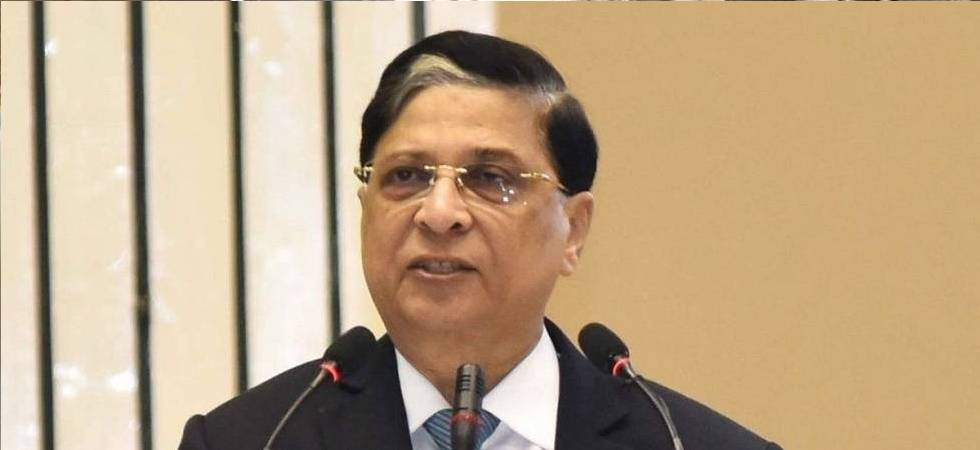
New Delhi:
The year 2018 will be remembered for political slugfest and controversies, with two top parties taking on each other in the run-up to the Lok Sabha elections 2019. While the Narendra Modi government came under direct attack from the Opposition for the Rafale jet deal and the snooping row, Congress president Rahul Gandhi has emerged as a matured, more credible leader after his party's victories in the assembly polls held recently.
Here are top 11 political events of 2018:
Congress’s surge: The defeats in the Rajasthan, Madhya Pradesh and Chhattisgarh assembly elections, results of which were declared on December 11, turned out to be the biggest setbacks for the BJP ever since the Narendra Modi government came to power at Centre in 2014. Interestingly, exactly a year back, Rahul Gandhi was appointed as Congress president on December 11, 2017. In the two-phase polls on November 12 and November 20, the Congress romped home to power in Chhattisgarh after 15 years with a two-third majority, winning 68 seats in the 90-member House. The BJP, in power in the state since 2003, was reduced to 15 seats. In Madhya Pradesh, the party won 114 seats in the 230-member House. It has secured support of a total of 121 MLAs, including SP - 1 and BSP - 2 legislators as also of four independents, to cross the majority mark of 116 seats. In Rajasthan, the Congress went from 21 seats against the BJP's 163 in 2013 to getting 99 seats (plus one of the Rashtriya Lok Dal) in the assembly elections. Bhupesh Baghel, Kamal Nath and Ashok Gehlot became chief ministers in Chhattisgarh, Madhya Pradesh and Rajasthan respectively. However, the Congress suffered a defeat in Mizoram as its chief minister Lal Thanhawla lost both the seats he had contested. The Mizo National Front (MNF) returned to power after a gap of 10 years by defeating the Congress in its last bastion in the northeast with a lead of 26 seats.
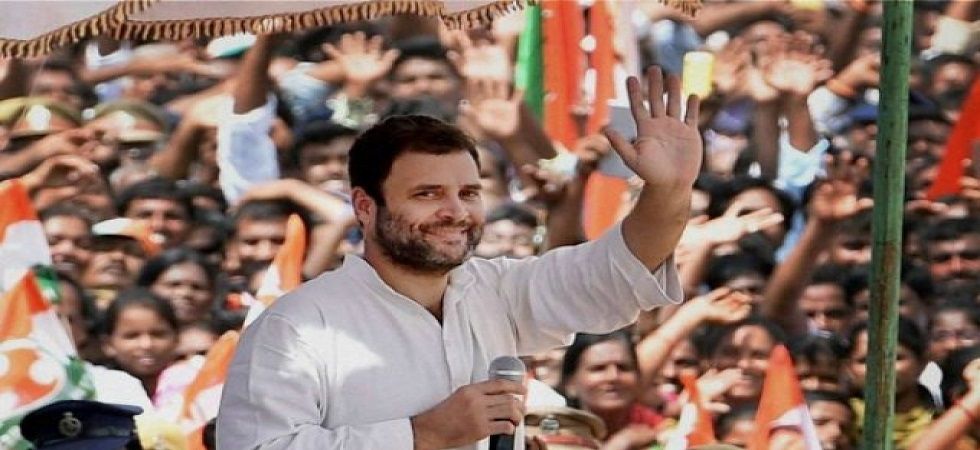
In the southern state Telangana, K Chandrashekhar Rao, popularly known as KCR, established his supremacy. His TRS had won a whopping 88 seats, way more than the 59 it needs for a majority in the 119-member assembly.
End of ‘Sarkar’ raj in Tripura: The biggest nightmare for the Left this year came in March when the BJP-IPFT alliance scripted history by securing a majority in the Tripura Assembly, marking the end of 25-year long reign of Communist Party of India (Marxist) in the state. The BJP won 36 seats on its own, while its ally, the Indigenous People's Front of Tripura (IPFT), was victorious in 8 constituencies. Surprisingly, the CPI (M) only bagged 16 seats in total. The Left front party had won 50 out of the 60 Assembly constituencies in the state in 2013. The secured 43 per cent vote share, which was less than two per cent votes in the 2013 Assembly election in the state. Its ally IPFT, which fielded candidates in nine seats, got nearly 8 per cent votes. The CPI (M), on the other hand, saw a little over 42 per cent voting in its favour. The Congress has not won a single seat in the state. Relatively new in politics, Biplab Kumar Deb, 46, became the Chief Minister.
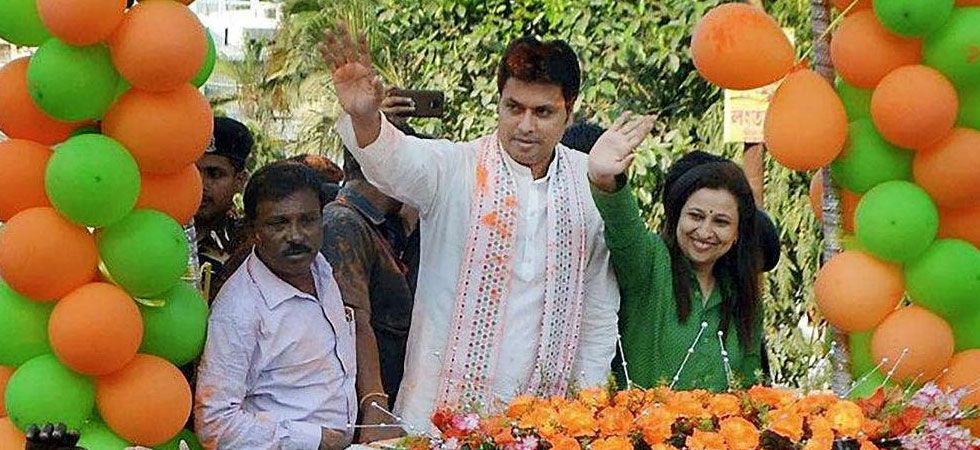
10 agencies can now 'spy' your computer: In December, the Union Home Ministry authorised central agencies to intercept, monitor, and decrypt "any information generated, transmitted, received or stored in any computer". The move created a political storm with the opposition parties decrying it as unconstitutional, undemocratic and an assault on fundamental rights. The issue rocked Rajya Sabha as Leader of Opposition Ghulam Nabi Azad alleged that "undeclared Emergency has taken final shape" and "all federal agencies have been let loose". According to the order, the subscriber or service provider or any person in charge of the computer resource will be bound to extend all facilities and technical assistance to the agencies. Failing to do so will invite a seven-year imprisonment and a fine. The central agencies authorised to the government are Intelligence Bureau, Narcotics Control Bureau, Enforcement Directorate, Central Board of Direct Taxes, Directorate of Revenue Intelligence, Central Bureau of Investigation, National Investigation Agency, Cabinet Secretariat (R&AW), Directorate of Signal Intelligence (for service areas of Jammu & Kashmir, Northeast and Assam only) and Commissioner of Police, Delhi.
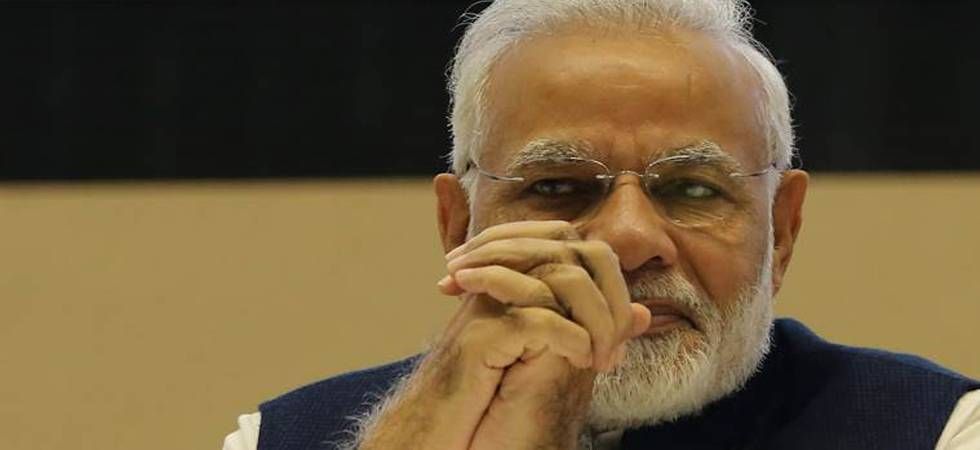
Union Minister Arun Jaitley hit back saying the Congress was crying foul over powers created by it when it was in government, adding that the opposition parties were playing with the national security and "making a mountain where even a molehill doesn't exist".
Jammu and Kashmir political turmoil: In June, Jammu and Kashmir was pushed into a major political crisis on after the BJP suddenly pulled out of the ruling combine with the PDP, bringing down Chief Minister Mehbooba Mufti's 27-month-old government amid surging violence in the state. The decision, which surprised the Mufti-led Peoples Democratic Party (PDP) and came days after the central government decided not to extend the Ramadan ceasefire, made another round of Governor's Rule imminent in the state where no political group or alliance won enough seats in the December 2014 elections to form a government on its own. Mehbooba Mufti resigned as the Chief Minister immediately after BJP announced its decision in a televised news conference. On November 21, Governor Satya Pal Malik dissolved the 87-member state assembly after the PDP, supported by the Congress and their arch rivals National Conference, had staked claim to form the government. Simultaneously, the two-member People's Conference led by Sajjad Lone had also staked claim to form a government with 25 members of the BJP and other 18 unknown members. The governor had dissolved the assembly citing horse-trading and lack of stability to form a government as the reasons. On December 20, after completion of six months of Governor's rule, the state came under President's rule from midnight paving the way for the Union cabinet to take all policy decisions related to the militancy-hit state.
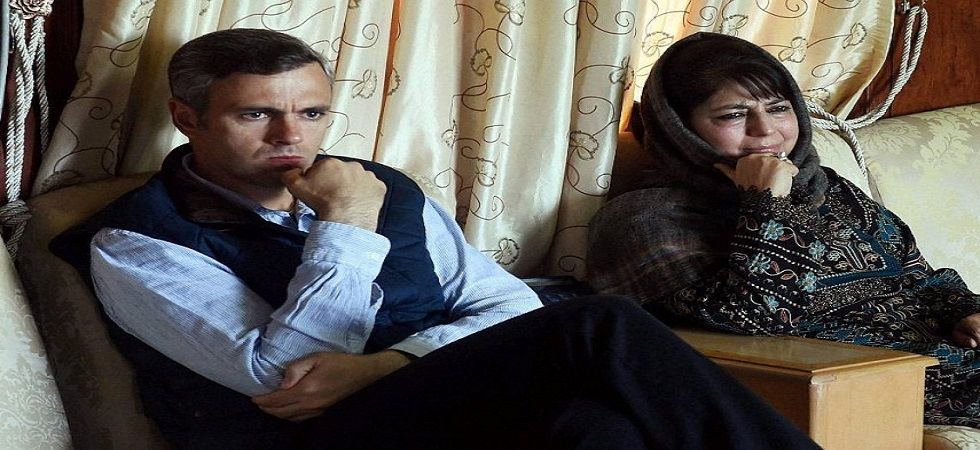
Rahul Gandhi’s 'jaadu ki jhappi': He is known for his hugs, but this was one hug Prime Minister Narendra Modi was not expecting. After a no-holds barred and scathing criticism of Modi on several issues, including Rafale jet deal on June 20, Congress president Rahul Gandhi walked across the green-carpeted well of Lok Sabha to Modi and hugged him, a gesture which took the Treasury Bench members by surprise. Gandhi's unexpected gesture, which quickly became a favoured video clip for television channels, came during a debate on no-confidence motion moved by the TDP against the Modi government during the Monsoon Session. Gandhi's speech was frequently disrupted and prompting Speaker Sumitra Mahajan to adjourn the House for 15 minutes. When he resumed his speech, Gandhi continued his attack. Just before wrapping up, he strode over to Modi for the now-famous hug.

Kathua and Unnao rape horrors: The brutal rape of and murder of an eight-year-old girl in Rasana village near Kathua in Jammu and Kashmir in January shocked the entire nation. The victim belonged to the nomad Bakarwal community. The girl disappeared for a week before her body was discovered by villagers a kilometre away from the village. The incident made national news when charges were filed against eight men in April. The arrests of the accused led to protests by the Panthers Party, along with other local groups. One of the protests, in support of the accused, was attended by two ministers from the BJP, both of whom later resigned amid a massive outcry. On September 9, doctors recorded their statement on the post-mortem report of the victim before the court of the Chief Judicial Magistrate. The report states the victim was sexually assaulted and died due to asphyxia.
She was kidnapped on January 10 and was gang-raped in a temple and then killed on January 14. On July 30, the crime branch had submitted a supplementary charge sheet in which it highlighted that the victim was administered a mixture of sedatives throughout her captivity to stop her from resisting sexual assault and murder. According to the police, Sanji Ram, who was the temple’s custodian, hatched the plan to terrorise the Bakarwals because 90 per cent of the Gujjar-Bakarwal community are Muslims.
Raping and killing the victim was an attempt to evict the tribal community from the area, especially from the Jammu region. The Supreme Court took a dig at some lawyers of Jammu Bar Association as well as the Kathua Bar for hindering the judicial process of the case. The Jammu and Kashmir government appointed two Sikh public prosecutors for the trial in this delicate case to ensure “neutrality” in view of Hindu-Muslim polarisation over the case.
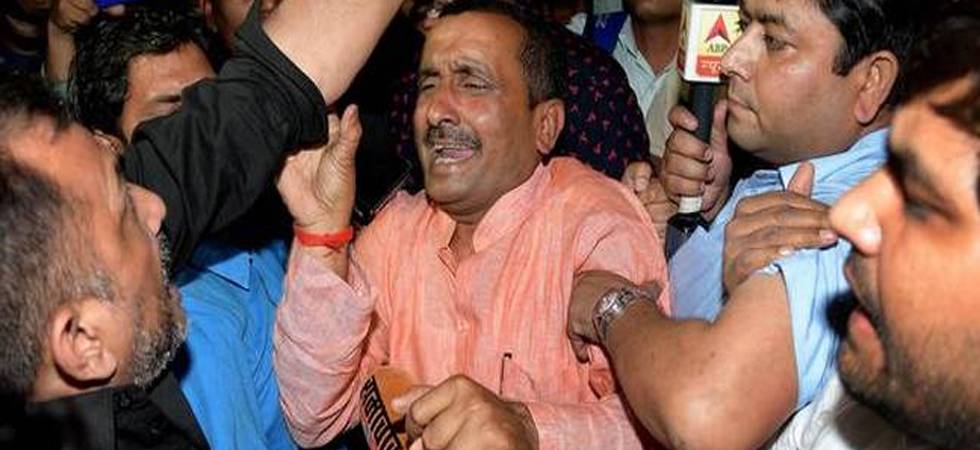
The Unnao rape case came to light in April when a 16-year-old victim and her family tried to immolate herself outside Uttar Pradesh Chief Minister Yogi Adityanath’s residence, alleging police inaction against the accused. The family alleged that the woman was raped by the BJP MLA Kuldeep Singh Sengar and his accomplices last year. The family added that the girl’s relatives were thrashed after a complaint was filed with the police in this regard. The case worsened when the victim’s father died in judicial custody a day later. The MLA’s brother, Atul Singh Sengar, was arrested along with four others, by the UP Crime Branch, for allegedly thrashing the victim’s father. On April 13, Sengar was arrested by the CBI. The arrest came hours after the Allahabad High Court had ordered the probe agency to immediately arrest the lawmaker and severely reprimanded the Adityanath government. Ahead of the high court ruling, the CBI, which had taken over the probe, had started questioning Sengar. The BJP lawmaker has been charged under the stringent sexual offences law to protect children and the penal code. It took the CBI 16 hours to arrest him.
Yogi Adityanath government in name-changing spree: The BJP- led Uttar Pradesh government has been busy changing the names of cities, schemes and projects in the state this year. It all started in May when the Adityanath government decided to name the Agra airport after Deen Dayal Upadhyaya, a Rastriya Swayamsevak Sangh (RSS) thinker and co-founder of the Bharatiya Jana Sangh. In June, the Uttar Pradesh government proposed the name changing of iconic Mughalsarai station near Varanasi after Upadhyaya. In August, it was officially inaugurated. On September 7, Adityanath announced the renaming of Panki Railway Station in Kanpur as ‘Panki Dham’ Railway Station on. “Dham” suggests a sacred place for Hindus. It drew criticism from citizens on social media. He also said the Kanpur Airport will be named after Ganesh Shankar Vidyarthi. On October 16, Adityanath announced to rename the historic city of Allahabad to Prayagraj, ahead of the 2019 Kumbh Mela. The move had drawn flak from the Opposition parties, including Congress and the Samajwadi Party. In November, the name of Faizabad district was changed to Ayodhya. On the occasion of the Diwali, Adityanath said the Faizabad district will henceforth be known as Ayodhya.
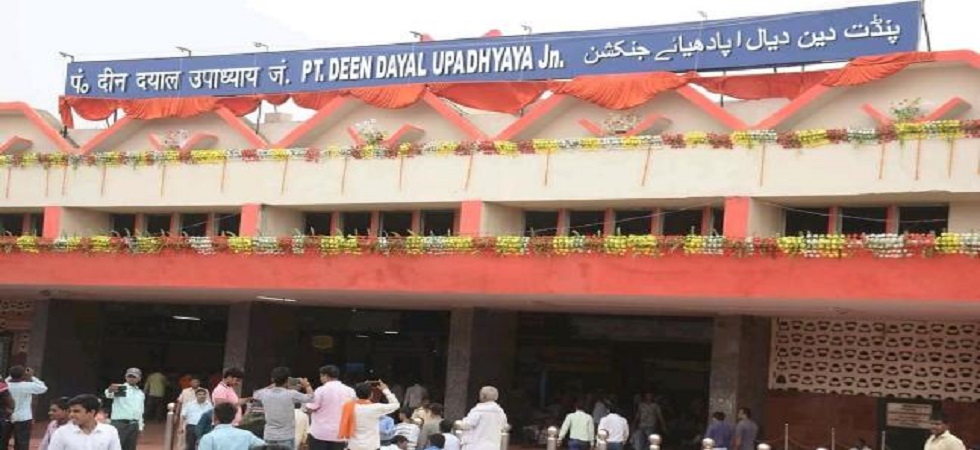
‘Mahagathbandhan’ in the making: Karnataka saw attempts at coming together of "like- minded secular parties" against the BJP-led NDA ahead of the Lok Sabha polls next year, with top opposition leaders attending the swearing-in ceremony of the new Congress-JDS coalition chief minister H D Kumaraswamy. After the elections threw up a hung assembly, the Congress and JDS stitched together a post-poll alliance to clinch power. From Kerala’s Pinarayi Vijayan to West Bengal’s Mamata Bannerjee, chief ministers of the few states that are yet to have a BJP dispensation in power joined hands with leaders of former UPA, and Third Front constituents like the NCP and CPI(M). However, the Congress’s strategy to stitch a Grand Alliance appears to be farfetched one. Despite the Congress's decent show in Assembly elections, Mayawati and Akhilesh Yadav are not ready to form an alliance with Rahul Gandhi's party. In fact, in a big blow to Rahul's grand alliance dreams, the Samajwadi Party chief said his party would go for a Congress-less alliance in Uttar Pradesh. Yadav's big statement came a day after the Congress didn't induct Samajwadi Party’s sole MLA in the Madhya Pradesh Cabinet.
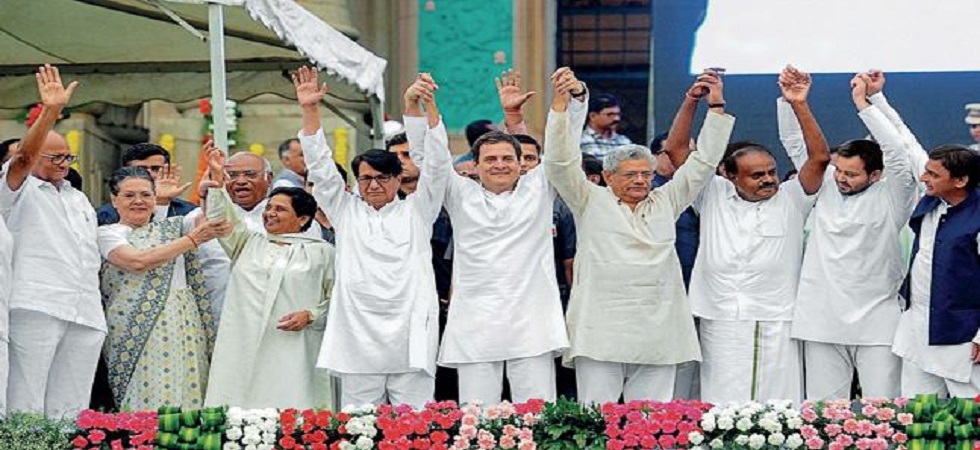
Rafale jet deal controversy: The fighter jet deal controversy remained one of the most talked-about issues of 2018, with the Congress accelerating its attack on the Modi government with every passing day. The Rahul-led Congress force has been alleging that the government had knowingly overpaid for the Rafale fighter jets and that it had promoted crony capitalism. The deal originally took shape under the Manmohan Singh-led United Progressive Alliance (UPA) government's second term. That deal was to buy 126 Rafale jets, which are manufactured by French aircraft manufacturer Dassault Aviation. Under the UPA agreement, 18 Rafale jets were to be bought off-the-shelf or in a 'flyaway' condition while the rest were to be manufactured in India by Hindustan Aeronautics Limited (HAL). However, the Modi government, when it came to power, scrapped the UPA-era deal and signed an inter-governmental agreement with France to purchase 36 Rafale jets in a 'flyaway' condition. The government's deal also mandated that Dassault make investments in India by tying up with Indian companies. One of those companies chose by Dassault was Anil Ambani's Reliance Defence. The Congress has been alleging massive irregularities in the deal and attacking the government for procuring just 36 jets when IAF required 126 jets. On December 14, the Supreme Court said it had found nothing wrong with a deal the Modi government signed with France to purchase 36 Rafale fighter jets. A bench headed by Chief Justice of India Ranjan Gogoi said it had studied the matter "extensively" and that it was "satisfied that there is no occasion to doubt the process [of signing the Rafale deal]." The ruling came on four petitions that had asked the Supreme Court to set up a court-monitored probe into the signing of the Rafale deal. The petitions had alleged that the Modi government not only overpaid for the Rafale jets but also promoted crony capitalism.
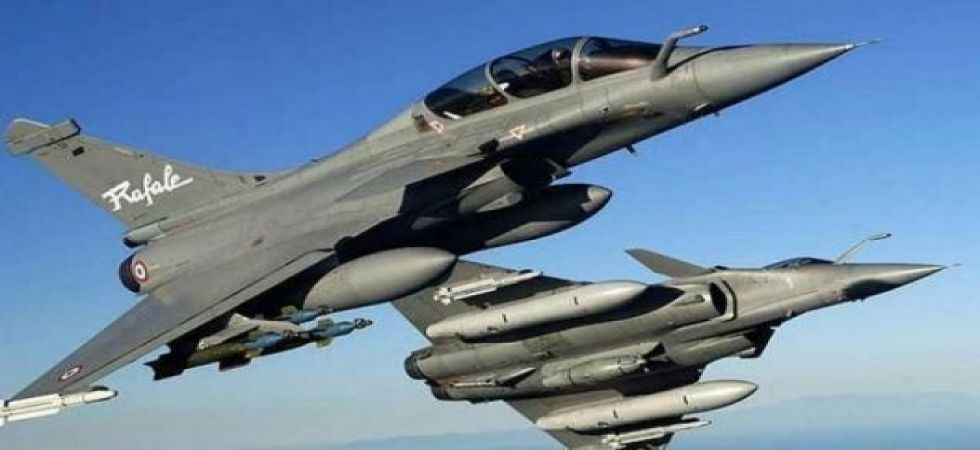
AgustaWestland 'middleman' Christian Michel takes name of 'Mrs Gandhi': On December 29, the Enforcement Directorate told Delhi's Patiala Court House that Christian Michel, an alleged middleman in the AgustaWestland VVIP chopper deal, had named 'Mrs Gandhi', but did not specify in which context the reference was made. The ED also told the special court that Christian Michel had spoken about "the son of the Italian lady" and how he is going to become the "next prime minister of the country". ED's lawyer said that Michel has spelled out how state-owned Hindustan Aeronautics Limited was removed from the deal and how it was offered to Tata instead. The ED also sought to ban Michel's lawyer's access to him alleging that he is being tutored from outside. Michel, who was extradited from Dubai recently, was arrested by the Enforcement Directorate on December 22 and sent to seven days custody of the agency over money laundering charges in the scam after he was produced in a court in Delhi. He was earlier lodged in Tihar Jail in the related CBI case. The CBI has alleged that he was paid a huge bribe amount by AugustaWestland which was given to the officers of Indian Air Force, MOD, bureaucrats, politicians and a family in India for showing favour in VVIP Helicopter deal. It alleged that an amount of euro 42.27 million was paid by Westland Group companies to the firms of accused as kickbacks. Michel is among the three alleged middlemen being probed in the case by the ED and the CBI. The others are Guido Haschke and Carlo Gerosa.
Opposition’s impeachment notice against CJI Dipak Misra: In April, a day after the Supreme Court dismissed pleas seeking an inquiry into the December 2014 death of Justice Brijgopal Harkishan Loya, the Opposition made its move to seek the impeachment of Chief Justice of India Dipak Misra. Leader of Opposition and Congress member Ghulam Nabi Azad said the motion to dismiss Justice Misra, submitted to Vice-President and Rajya Sabha Head Venkaiah Naidu, had received the signatures of 71 Parliamentarians (of which seven have retired). Naidu, however, rejected the notice. In his 10-page order, Naidu has dealt with every charge mentioned and claimed that the Opposition MPs were "unsure" of their own case and was based on "suspicion and conjectures." Naidu's order observed, "The Hon'ble Members of Parliament who have presented the petition are unsure of their own case. Page 1 of the petition uses phrases such as 'the facts and circumstances of the Prasad Education Trust show prima facie evidence suggesting that the Chief Justice of India 'may have been' involved in a case of illegal gratification..." Naidu cited a Supreme Court order to reiterate that the CJI, as Master of Roster, was entitled to allocate cases as he deemed fit and referred it as an internal matter of the judiciary." Rajya Sabha sources said the Chairman took a quick decision to avoid an "uncomfortable" situation for the occupant of one of the highest constitutional authorities, the Chief Justice of India.
